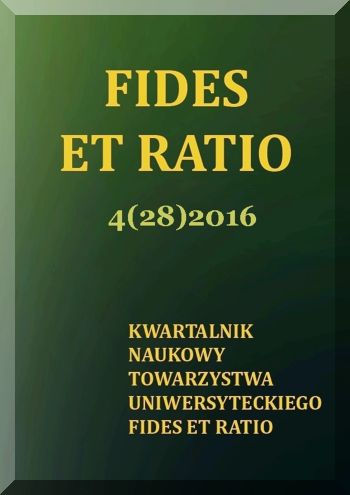Abstract
The author shows the beauty of femininity, which she presents as the truth about man. She sketches a brief historical overview of women issues, as the background of modern continuation of the discussion on the situation of women in the world. She brings closer some concepts and trends concerning the matters related to femininity, the place and role of women in society. She points the Christian personalism and cites the important representatives of this trend, such as Edith Stein and John Paul II. She emphasizes the specificity, potentiality, beauty and genius of women as an important value in the modern world. Her answer to a question, how to prepare a woman for the adoption and development of their femininity, is a conclusion in which she says: “It seems extremely important to educate women not to specific roles and not according to the cultural and social ideas, but to the consciousness of their own abilities as a gift allowing to take the most important tasks included in the vocation of women, allowing to take them in different places and roles"
References
de Beauvoir S. (2009) Druga płeć, tłum. G. Mycielska, M. Leśniewska, Warszawa: Wydawnictwo Czarna Owca.
Gilligan C. (1982), In a Different Voice, Cambridge, Massachusetts, London: Harvard University Press.
Grzegorczyk A. (2001), Nauka Edyty Stein o kobiecie wobec współczesnych tendencji feministycznych, (w:) Św. Teresa Benedykta od Krzyża (Edyta Stein). Kobieta i Karmelitanka Bosa – Patronką Europy. Poznań: Flos Karmeli.
Held V. (2006), The ethics of care: Personal, political, and global, Oxford: University Press.
Jan Paweł II (1988), List Apostolski Mulieris Dignitatem, Rzym.
Juruś D. (2015), Czy etyka troski może prowadzić do zaniku troski? Roczniki Filozoficzne, nr 2, s. 187-206.
Konstytucja duszpasterska Soboru Watykańskiego II Gaudium et spes, O Kościele w świecie współczesnym. Rzym 1965.
Mead M. (1982), Płeć i charakter, przeł. T. Hołówka, (w:) Nikt nie rodzi się kobietą, wybór, przeł. i wstęp T. Hołówka, Warszawa: Czytelnik.
Mead M. (2015), Mężczyźni i kobiety, przeł. A. Kochan, K. Jagiełło, Kraków: vis-a-vis/Etiuda.
Moir A., Jessel D. (2008), Płeć mózgu. O prawdziwej różnicy między mężczyzną a kobietą, tłum. N. Kancewicz-Hoffman, Warszawa: Państwowy Instytut Wydawniczy.
Noddings N. (1984), Caring: The Feminine Approach to Ethics and Moral Education, Berkeley, Los Angeles: University of California Press.
Reber A.S. (2005), Słownik psychologii. Warszawa: Wydawnictwo Naukowe "Scholar”.
Sobór Watykański II (2005), Gaudium et spes, O Kościele w świecie współczesnym, Pallotinum.
Stein E. (1999), Kobieta - Jej zadanie według natury i łaski. Przekład s. J. I. Adamska OCD, Tczew – Pelplin: Wydawnictwo Bernardinum.
Stein E. (2005), Refleksje o kobiecie, tłum. J.I. Adamska OCD, M. Grzywacz, Borne Sulinowo.
Uliński M. (2001), Kobieta i mężczyzna. Dzieje refleksji filozoficzno-społecznej, Kraków: Wydawnictwo Aureus.
Uliński M. (2012), Etyka troski i jej pogranicza. Kraków: Wydawnictwo Aureus.
